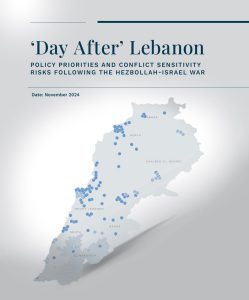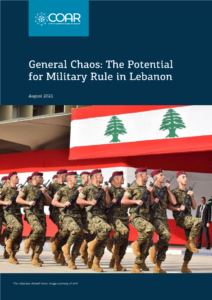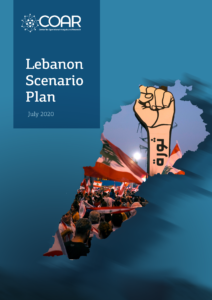COAR’s field team in Lebanon provides in-depth insight to support donors and response actor programming. Set up in 2019 by a team of analysts and researchers who have extensive experience and knowledge of the country’s landscape, COAR has been closely following the trajectory of Lebanon’s economic, social and security paradigms. Our network of field researchers and monitors cover the whole of Lebanon including Palestinian refugee camps and Syrian refugee settlements. This allows COAR’s Lebanon team to monitor events in real-time, gauge local insights at community level and produce analytical products of relevance to policymakers, humanitarian and development actors.

After more than 13 months of fighting between Hezbollah and Israeli forces, Lebanon is cautiously turning toward post-conflict recovery. Yet a recovery phase brings its own risks. The Lebanese state is weak, corruption is endemic, and the war has aggravated sectarian imbalances. Shiite communities have experienced the conflict’s worst effects, and Hezbollah — a key provider of social services in Shiite communities neglected by the state — has faced its most significant setback in decades. Conflict losses and sanctions on Hezbollah-linked social service entities raise questions about its ability to meet constituents’ needs.
COAR’s latest report explores the critical impacts of the war, highlighting the challenges for stabilisation and reconstruction in Lebanon.
Lebanon has been on a downward trajectory characterised by economic collapse, increased political and sectarian polarization, and a state of general chaos since the mass uprisings of October 2019. Intra-Lebanese tensions have risen considerably in the intervening period: Armed clashes over basic resources have become the norm, the state’s inability to provide basic services has fuelled popular anger, protests, and violent riots, and an eroded security apparatus has resulted in increased crime and a corresponding rise in community policing and vigilantism. Meanwhile, unaddressed grievances have led to intense armed clashes, most notably those recently witnessed in Tayyouneh and Khalde. In light of these developments, COAR has been commissioned by an unnamed client to analyse the likely trajectory of potential conflict in Lebanon, with a specific focus on several selected areas, namely, Tripoli, Bourj Barajne camp, Khalde and Central Bekaa.

Since mass protests erupted in October 2019, the Lebanese population have demanded the complete overhaul of the country’s political system. Having lost faith in the ruling elite and buoyed by the belief that military rule is a ‘last resort’ that can prevent the country’s demise, some protestors have called for a military government. While the fate of the Lebanese military has preoccupied analysts, many have focused narrowly on army cohesion amid state collapse in Lebanon. Instead, this briefing note explores the possibility of a military government and sketches out the underlying conditions that it would require.

Within the context of Lebanon’s accelerating and volatile deterioration, AFD commenced their five-year country strategy planning process with the aim of crisis prevention and sustainable development. To inform the strategic planning process, COAR undertook scenario planning in case of security/economic/social deterioration by analyzing and assessing the drivers, as well as the implications of significantly deteriorated scenarios for international development actors in Lebanon. These scenarios outline the structural drivers of fragility, underlying sectoral and institutional characteristics in addition to the short and long term implications of destabilization for the international community. COAR also identified and analysed the potential implications for international development agencies and banks in each of the areas listed above in terms of: short and long term developmental impacts; developmental risks and opportunities to be anticipated key elements of a risk mitigation / contingency planning strategy; potential blind spots in donor strategic frameworks and actions; opportunities for donors to collaborate.

The content compiled and presented by COAR Global LTD is by no means exhaustive and does not reflect COAR’s formal position, political or otherwise, on the aforementioned topics. The information, assessments, and analysis provided by COAR are only to inform humanitarian and development programs and policy.
Copyrights for COAR Global © 2025